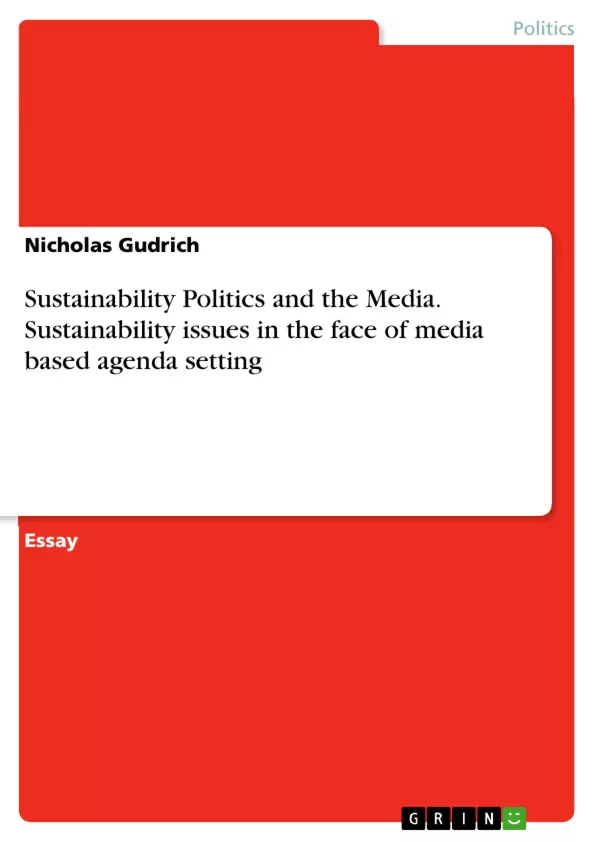While there can be no doubt that the modern information society does much to strenghthen the global sustainability movement, the mass media‘s shifting focus can also lead to serious problems when it comes to promoting those sustainability topics which do not make for interesting headlines and draw very little mediatic repercussion.
In this context, one can distinguish several different problematic scenarios, to each of which I will devote a short passage of this essay.
Inhaltsverzeichnis (Table of Contents)
- Scenario 1: The rule of the worst news
- Scenario 2: The Good VS. the Nice - competition for mediatic aknowledgement
- Scenario 3: Sustainability is soooo boring *yawn*
- Scenario 4: The unpopular truth - dealing with systemic taboos
- Internet activism and NGOs - the knight in shining armour for sustainability politics?
Zielsetzung und Themenschwerpunkte (Objectives and Key Themes)
This essay explores the challenges faced by sustainability politics in a media-driven society. It examines how the media's focus on sensational news and limited space can hinder the promotion of complex and less-interesting sustainability topics. The essay also investigates the impact of internet activism and NGOs on shaping the sustainability agenda.
- The influence of media on sustainability politics
- The challenges of promoting complex and less-interesting sustainability topics
- The role of internet activism and NGOs in shaping the sustainability agenda
- The importance of public awareness and engagement for successful sustainability politics
- The limitations of activism in influencing policy decisions
Zusammenfassung der Kapitel (Chapter Summaries)
- Scenario 1: The rule of the worst news examines how major events and catastrophes can overshadow more subtle sustainability issues. The essay uses the examples of the Samarco dam disaster and the terrorist attacks in Paris to illustrate how media attention shifts, potentially hindering progress in sustainability politics. It also explores the need for effective PR strategies to promote long-term sustainability goals and create public interest.
- Scenario 2: The Good VS. the Nice - competition for mediatic aknowledgement discusses the competition among different stakeholders to gain media attention for their specific sustainability issues. The essay highlights the challenges of fostering collaboration and interdisciplinary approaches when faced with the pressure to promote individual agendas. It emphasizes the importance of prioritizing collaborative efforts over individual competition for long-term sustainability outcomes.
- Scenario 3: Sustainability is soooo boring *yawn* examines how the complexity and long-term nature of many sustainability issues can make them uninteresting to the general public and, consequently, to the media. The essay underscores the importance of public interest in securing funding and raising awareness for sustainability initiatives. It argues that finding unique selling points for these issues is crucial for garnering public attention and support.
- Scenario 4: The unpopular truth - dealing with systemic taboos explores how the media can be influenced by systemic forces and political agendas, hindering the coverage of certain sustainability topics. The essay uses the example of degrowth, arguing that it is often marginalized by the media due to its incompatibility with capitalist ideology. It emphasizes the importance of independent journalism in providing a counterweight to these systemic biases.
- Internet activism and NGOs - the knight in shining armour for sustainability politics? examines the impact of internet activism and NGOs on the sustainability agenda. The essay acknowledges the potential of these groups in raising awareness and influencing policy decisions. However, it also highlights the challenges of managing the deluge of activism and navigating the complex landscape of competing interests. It underscores the need for strategic collaboration and careful selection of activism to effectively support sustainability politics.
Schlüsselwörter (Keywords)
This essay focuses on the relationship between sustainability politics, media coverage, and public awareness. Key topics include agenda setting, media bias, internet activism, NGOs, public engagement, and the challenges of promoting complex and long-term sustainability issues. The essay also touches upon the influence of systemic factors and the importance of independent journalism in shaping the sustainability discourse.
Frequently Asked Questions
How does the media influence sustainability politics?
Media acts as an agenda-setter. Topics that are spectacular or easy to visualize get more attention, while complex long-term issues often go ignored.
What is "the rule of the worst news"?
It describes the media's tendency to focus on catastrophes and immediate crises, which can overshadow subtle but critical sustainability progress.
Why is sustainability sometimes perceived as "boring"?
Many sustainability issues are slow-moving and highly technical, lacking the immediate drama or conflict that traditional news outlets prefer.
What role do NGOs play in media agenda setting?
NGOs use strategic PR and internet activism to force sustainability topics into the public eye and put pressure on political decision-makers.
What is "Degrowth" and why is it often a media taboo?
Degrowth is a systemic critique of capitalist growth. It is often marginalized because it challenges the fundamental economic structures that most mainstream media operate within.
- Quote paper
- M.A. Nicholas Gudrich (Author), 2016, Sustainability Politics and the Media. Sustainability issues in the face of media based agenda setting, Munich, GRIN Verlag, https://www.grin.com/document/338705



